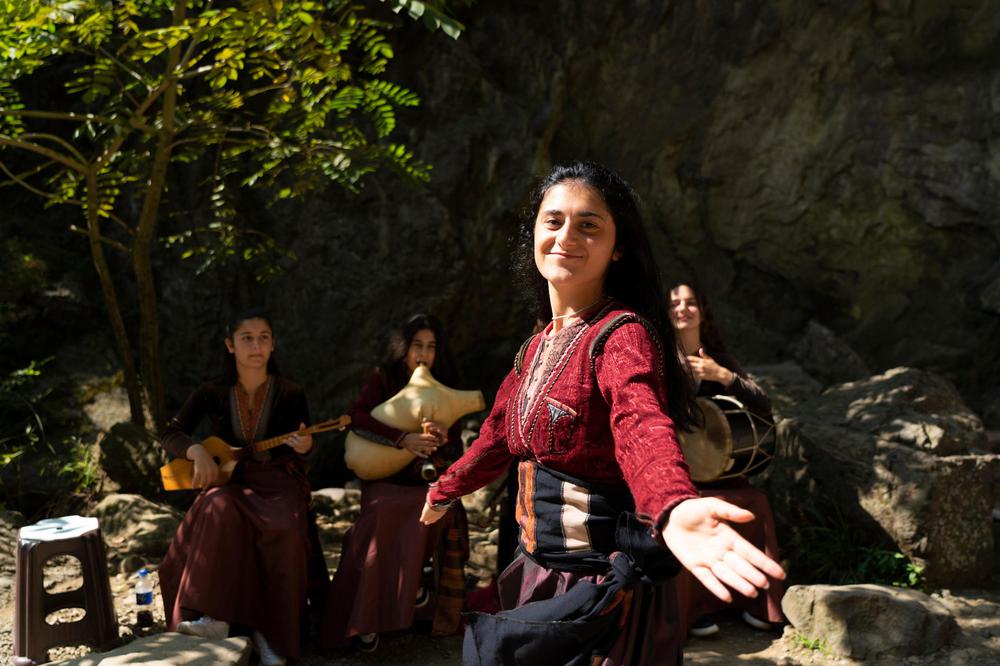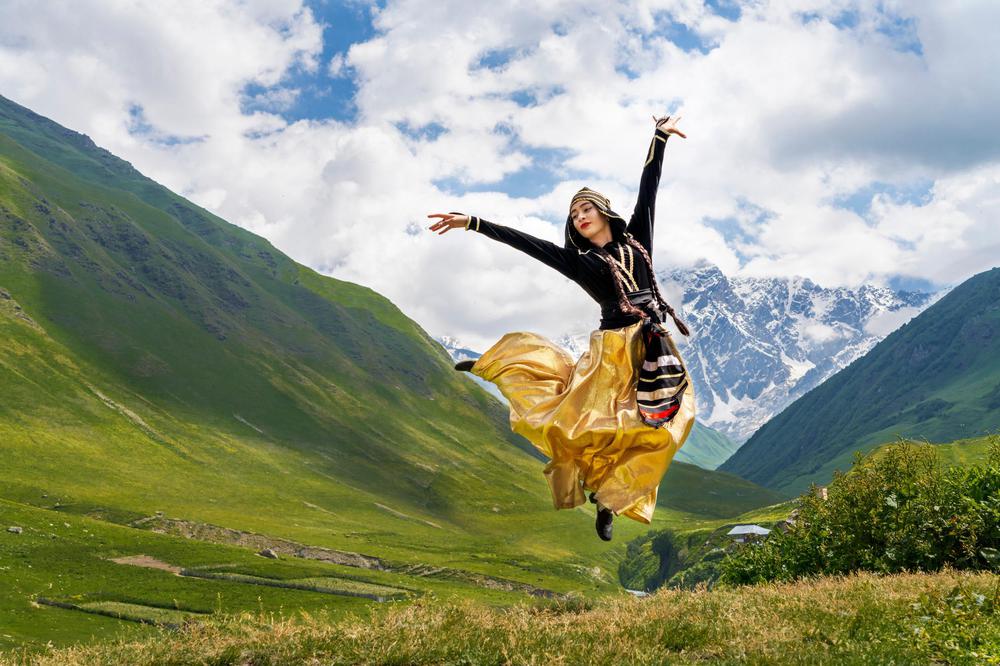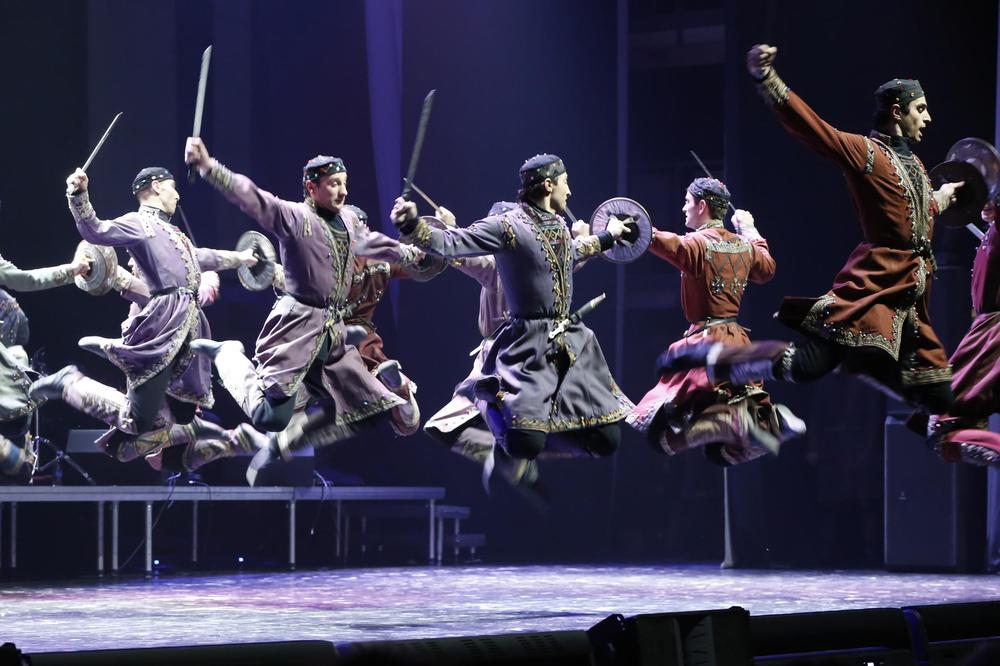Georgia, a country with a deep and diverse cultural heritage, offers a treasure trove of captivating performances for both locals and visitors to experience. Theater, dance, and music have always played significant roles in Georgian culture, showcasing the nation's creative spirit, and serving as a means to express its rich history and values. This article aims to introduce you to the vibrant world of Georgian performance arts, taking you on a journey through the country's captivating theater, mesmerizing dance, and melodious music scenes, offering a glimpse into the heart and soul of Georgia's artistic legacy.
Georgian Theater
Brief history of theater in Georgia
Georgian theater has a rich and storied history that dates back centuries, with its roots in folk traditions and religious performances. Over time, it has evolved and adapted to various influences, both local and international.
Notable Georgian playwrights and plays
Notable Georgian playwrights such as Shota Rustaveli, Davit Kldiashvili, and Lasha Tabukashvili have contributed immensely to the country's theatrical heritage, creating plays that capture the essence of Georgian culture and values. Their works continue to be celebrated and performed today, alongside contemporary pieces that address modern issues and experiment with new forms.
Famous theaters in Tbilisi and other cities
The capital city of Tbilisi is home to several famous theaters, such as the Rustaveli Theater, Marjanishvili Theater, and the Tbilisi State Puppet Theater. These venues showcase a wide range of performances, from classical plays to modern productions. In other cities, such as Kutaisi and Batumi, regional theaters also contribute to the flourishing Georgian theater scene.
Contemporary theater scene and experimental performances
In recent years, the contemporary theater scene in Georgia has experienced a surge in experimental and avant-garde performances. These productions challenge traditional norms and push the boundaries of the art form, encouraging new approaches and innovative ideas that keep Georgian theater fresh and engaging for audiences of all ages.
Traditional Georgian Dance
Dance holds a special place in Georgian culture, with its distinctive styles and captivating movements that have been passed down through generations. It serves as a powerful expression of the country's history, emotions, and identity, while also providing a unique form of entertainment and storytelling.
Distinctive Features of Georgian Dance
Georgian dance is characterized by its fluidity, athleticism, and grace. Dancers showcase incredible strength and agility, performing acrobatic feats and complex choreography. The dances often involve intricate footwork, synchronized movements, and impressive displays of balance and coordination.
Popular Folk Dances: Kartuli, Khorumi, and Mtiuluri
Among the many captivating Georgian dances, Kartuli, Khorumi, and Mtiuluri stand out as particularly popular and iconic. Kartuli is a graceful and romantic dance, often performed at weddings and celebrations. Khorumi is a powerful and energetic war dance, originating from the Adjara region and performed by male dancers. Mtiuluri is a high-spirited dance from the mountainous regions, characterized by its fast-paced movements and cheerful melodies.
Georgian National Ballet - Sukhishvili
The Georgian National Ballet, also known as Sukhishvili, has been showcasing the beauty and skill of Georgian dance on the world stage for decades. Founded in 1945 by Iliko Sukhishvili and Nino Ramishvili, the company has earned international acclaim and has performed in over 90 countries. With a repertoire that includes both traditional and contemporary pieces, Sukhishvili continues to captivate audiences and preserve Georgia's rich dance heritage.
Georgian Polyphonic Singing
Georgian polyphonic singing is a mesmerizing and ancient musical tradition that has been an integral part of the country's cultural fabric for centuries. Its complex harmonies and unique vocal techniques create a rich tapestry of sound that resonates with audiences worldwide.
UNESCO Intangible Cultural Heritage Status
Recognizing the cultural significance and value of Georgian polyphonic singing, UNESCO inscribed it on the Representative List of the Intangible Cultural Heritage of Humanity in 2001. This prestigious designation highlights the importance of preserving and promoting this unique art form for future generations.
Regional Styles and Repertoire
Georgian polyphonic singing varies across different regions, each boasting its distinct style and repertoire. In eastern Georgia, songs often feature two or three-part harmonies, while in the western part of the country, ensembles perform with three or four distinct vocal parts. The repertoire includes a diverse range of songs, from historical and heroic ballads to love songs and work chants, reflecting the many facets of Georgian life.
The Role of Polyphonic Singing in Georgian Rituals and Celebrations
Polyphonic singing plays a vital role in various Georgian rituals and celebrations, such as weddings, funerals, and religious ceremonies. It serves to express emotions, tell stories, and strengthen social bonds within communities. The tradition of singing around the "supra" (Georgian feast) table is particularly important, where toasts and songs intertwine to create a memorable and heartfelt experience.
Classical Music and Opera
While Georgian classical music and opera may not be as well-known as their European counterparts, the country boasts a rich and diverse history in these art forms. From the early days of church music to the blossoming of national romanticism in the 19th and 20th centuries, Georgia has produced a wealth of talented composers, musicians, and singers.
Georgian Composers and Their Works
Some of the most celebrated Georgian composers include Zakaria Paliashvili, Dimitri Arakishvili, and Otar Taktakishvili. Their compositions draw from the depth of Georgian musical traditions, blending Western classical styles with the unique harmonies and rhythms of Georgian folk music. Many of their works, such as Paliashvili's opera "Abesalom and Eteri" and Arakishvili's "The Legend of Tariel," have become iconic pieces in the Georgian classical music canon.
Tbilisi Opera and Ballet Theatre
The Tbilisi Opera and Ballet Theatre, founded in 1851, is the heart of Georgia's opera and ballet scene. This architectural gem, adorned with ornate decorations and plush red seating, has hosted countless performances of Georgian and international operas and ballets. It has been a launchpad for many of the country's most famous artists and continues to be a beacon of cultural life in Tbilisi.
Other Notable Opera and Classical Music Venues
In addition to the Tbilisi Opera and Ballet Theatre, Georgia is home to several other notable venues for classical music and opera enthusiasts. The Tbilisi State Conservatoire, established in 1917, regularly hosts concerts featuring up-and-coming musicians and renowned performers alike. The Kutaisi Opera House and the Batumi Music Center are also important cultural hubs, showcasing the best of Georgian and international classical music talent.
Contemporary Georgian Music Scene
Diversity of Contemporary Georgian Music Genres
The contemporary Georgian music scene is as vibrant and diverse as the country itself. From folk and indie rock to electronic and jazz, Georgia's musicians continue to push boundaries and experiment with new sounds. Georgian artists are unafraid to blend traditional elements with modern influences, creating a unique fusion that reflects the country's dynamic culture.
Popular Georgian Bands and Musicians
Many Georgian bands and musicians have gained local and international recognition for their innovative sounds. Groups like Mgzavrebi, The Shin, and Young Georgian Lolitaz have captured the hearts of music lovers with their unique blends of Georgian folk, rock, and pop. Solo artists like Nino Katamadze, Katie Melua, and Bera have also made their mark on the world stage with their distinctive musical styles.
Music Festivals and Events
Throughout the year, Georgia hosts numerous music festivals and events that showcase the best of the country's contemporary music scene. Tbilisi Open Air, the biggest music festival in Georgia, attracts thousands of visitors with its eclectic lineup of local and international acts. The Tbilisi Jazz Festival and the Black Sea Jazz Festival are other popular events, drawing jazz aficionados from around the world to enjoy the diverse sounds of Georgian and global artists.
Live Music Venues and Clubs
Georgia's live music venues and clubs provide the perfect setting for discovering the country's contemporary music scene. In Tbilisi, places like Vitamin Cubes, Mtkvarze, and Tbilisi Event Hall host regular live performances and DJ sets, offering a mix of local talent and international acts. Smaller venues, such as Maspindzelo and Art-Café Home, provide intimate settings for acoustic performances and jam sessions, allowing music lovers to experience the richness of Georgia's contemporary sound up close.
Experiencing Georgian Performances
When planning to attend a cultural performance in Georgia, it's essential to do some research and book tickets in advance, especially for popular events and venues. Check the schedules of theaters, concert halls, and clubs, and make sure to arrive early to find a good seat. Many performances will have English subtitles or translations, but it's always a good idea to familiarize yourself with the story or music beforehand to enhance your enjoyment.
Recommended Cultural Events and Festivals
There are numerous cultural events and festivals throughout the year in Georgia that showcase the best of the country's theater, dance, and music scenes. Some notable events include the Tbilisi International Theater Festival, the ArtGene Festival, the Tbilisi Jazz Festival, and the Black Sea Jazz Festival. Each event offers a unique opportunity to experience Georgian culture and connect with the local artistic community.
Etiquette and Dress Code for Performances
Georgians take pride in their cultural heritage and expect visitors to show respect when attending performances. It's important to adhere to the dress code, which can vary depending on the venue and the event. For theaters and opera houses, smart casual or semi-formal attire is typically expected. For dance performances, concerts, and music clubs, the dress code can be more relaxed, but it's still important to dress appropriately. Be sure to arrive on time, turn off your mobile phone, and refrain from talking or taking photos during the performance, unless otherwise permitted.
Conclusion
Embracing the Spirit of Georgian Cultural Performances
Georgia's vibrant cultural scene is a testament to the country's rich history, unique traditions, and the enduring passion of its people for theater, dance, and music. The captivating beauty of Georgian polyphonic singing, the mesmerizing power of traditional dance, and the inspiring world of theater and contemporary music all combine to create a truly exceptional cultural experience for both locals and visitors alike.
To truly appreciate the depth and diversity of Georgian culture, it's essential to immerse yourself in the world of the country's performing arts. Whether attending a classical opera, witnessing the magic of traditional dance, or exploring the contemporary music scene, each experience will leave you with a deeper understanding and appreciation of Georgia's rich artistic heritage.
As you plan your journey through Georgia's vibrant cultural landscape, remember to keep an open mind and be prepared to be amazed by the unique and captivating world of Georgian theater, dance, and music. With so many incredible performances and events to choose from, you're sure to discover something that resonates with your own artistic sensibilities and leaves you with unforgettable memories of your time in this enchanting country.

 Georgian Dance
Georgian Dance
 Georgian Music
Georgian Music
 Georgian Theatre
Georgian Theatre
 Georgian Film Industry
Georgian Film Industry
 GIMS, Gandagana & Georgia
GIMS, Gandagana & Georgia








